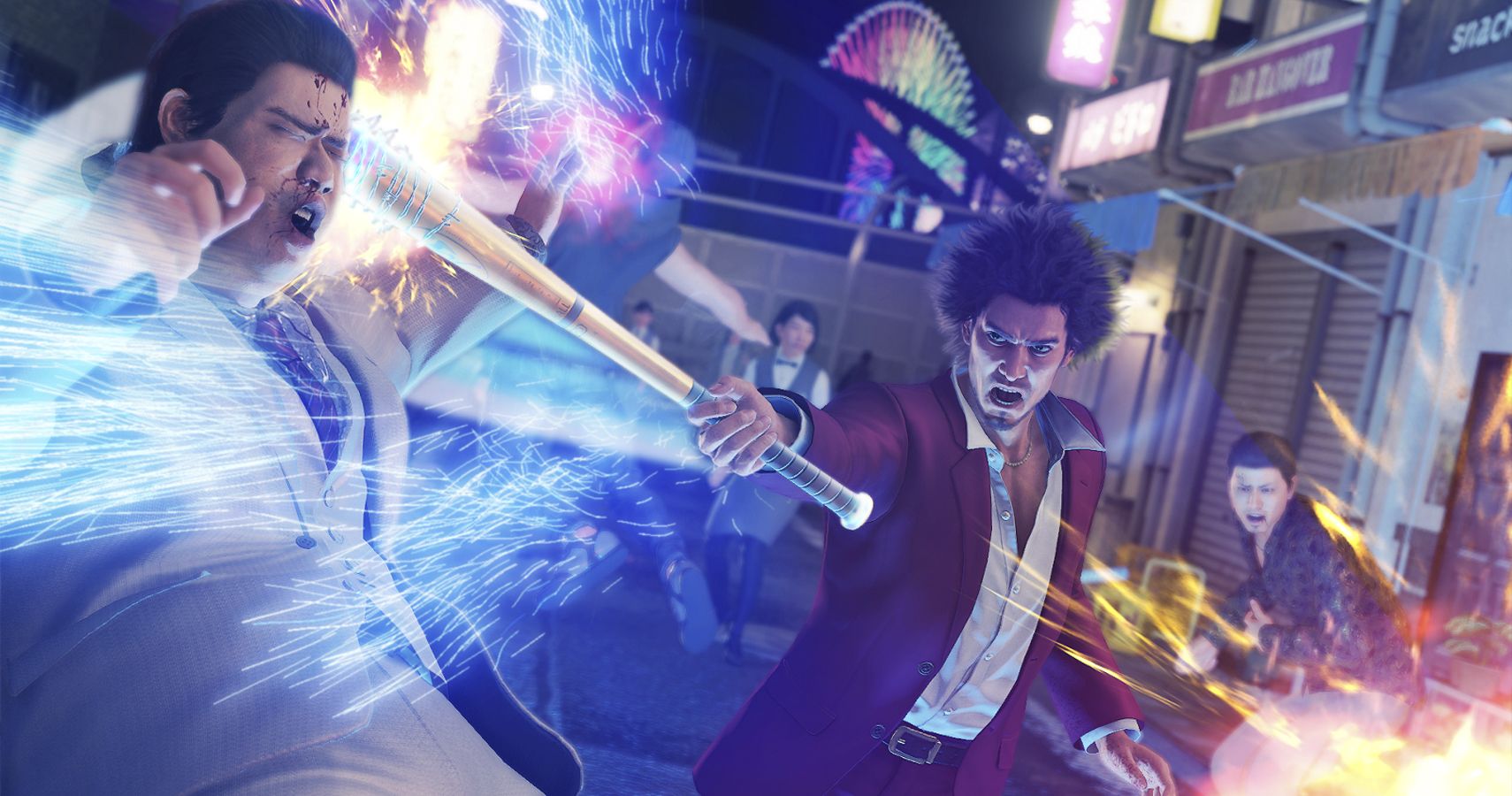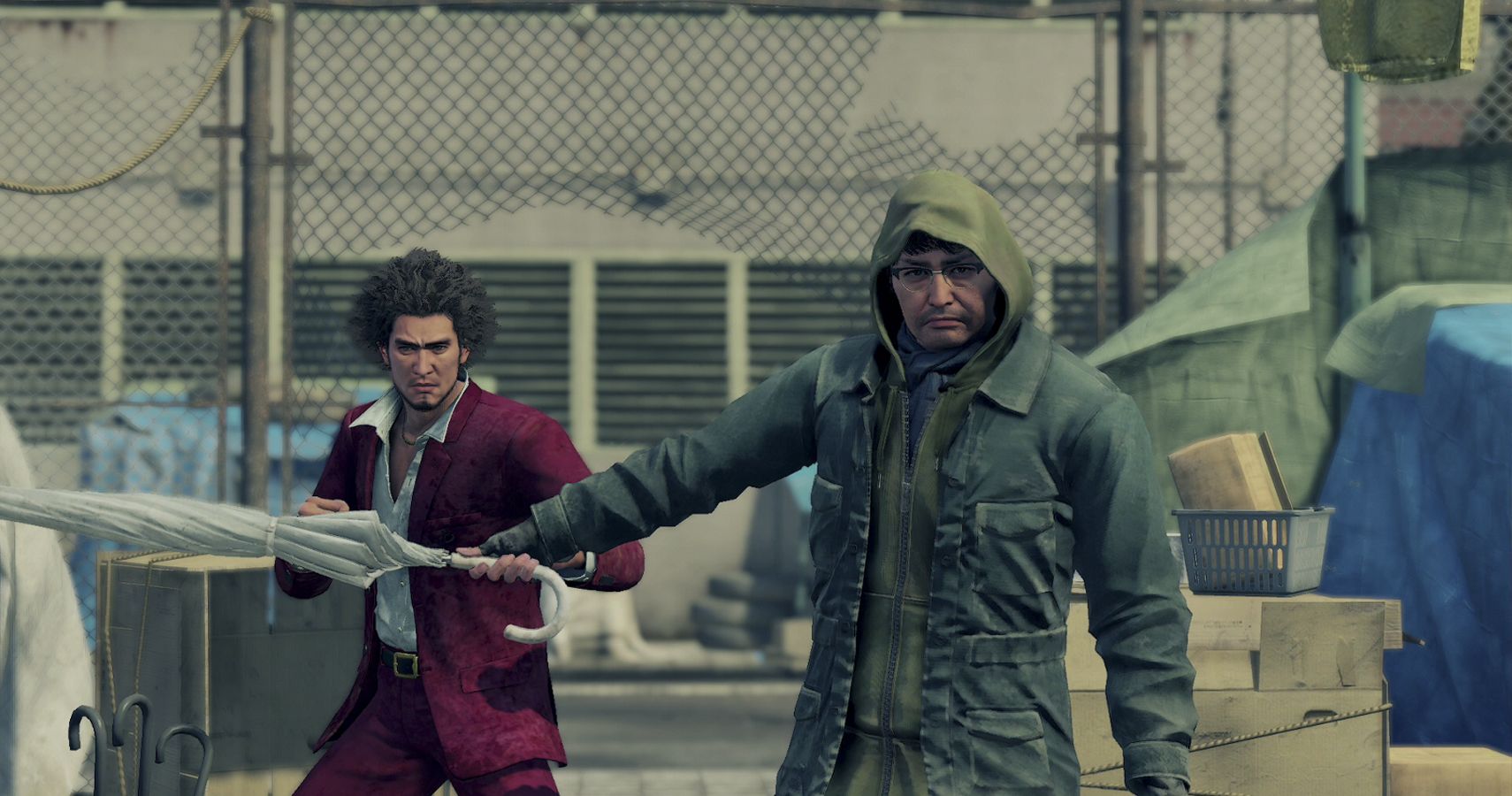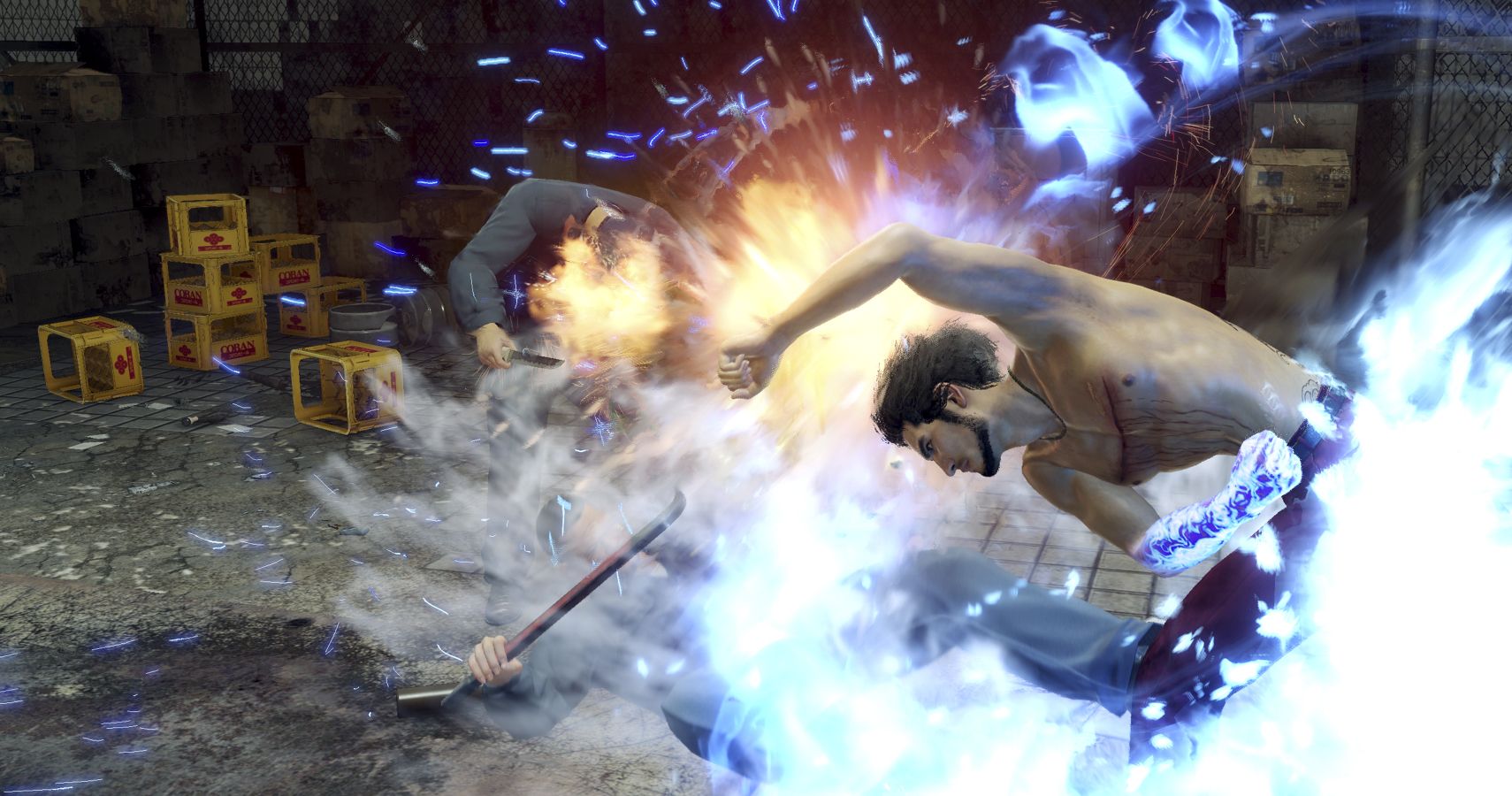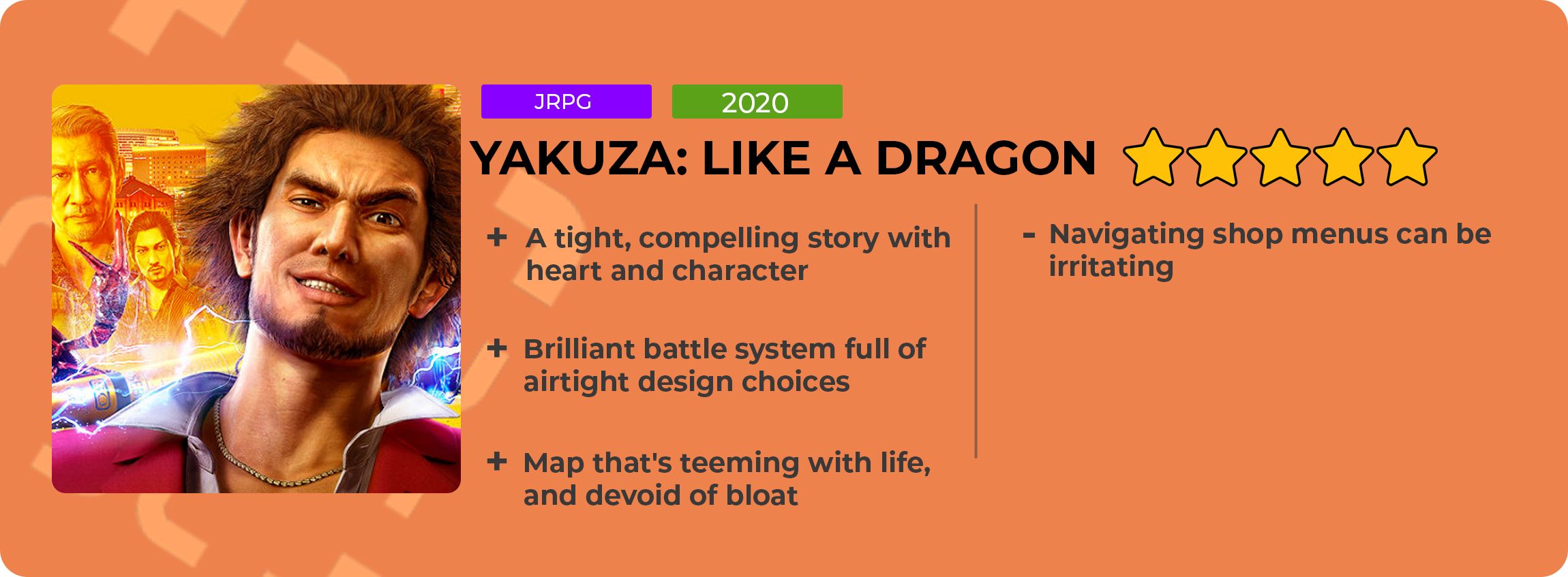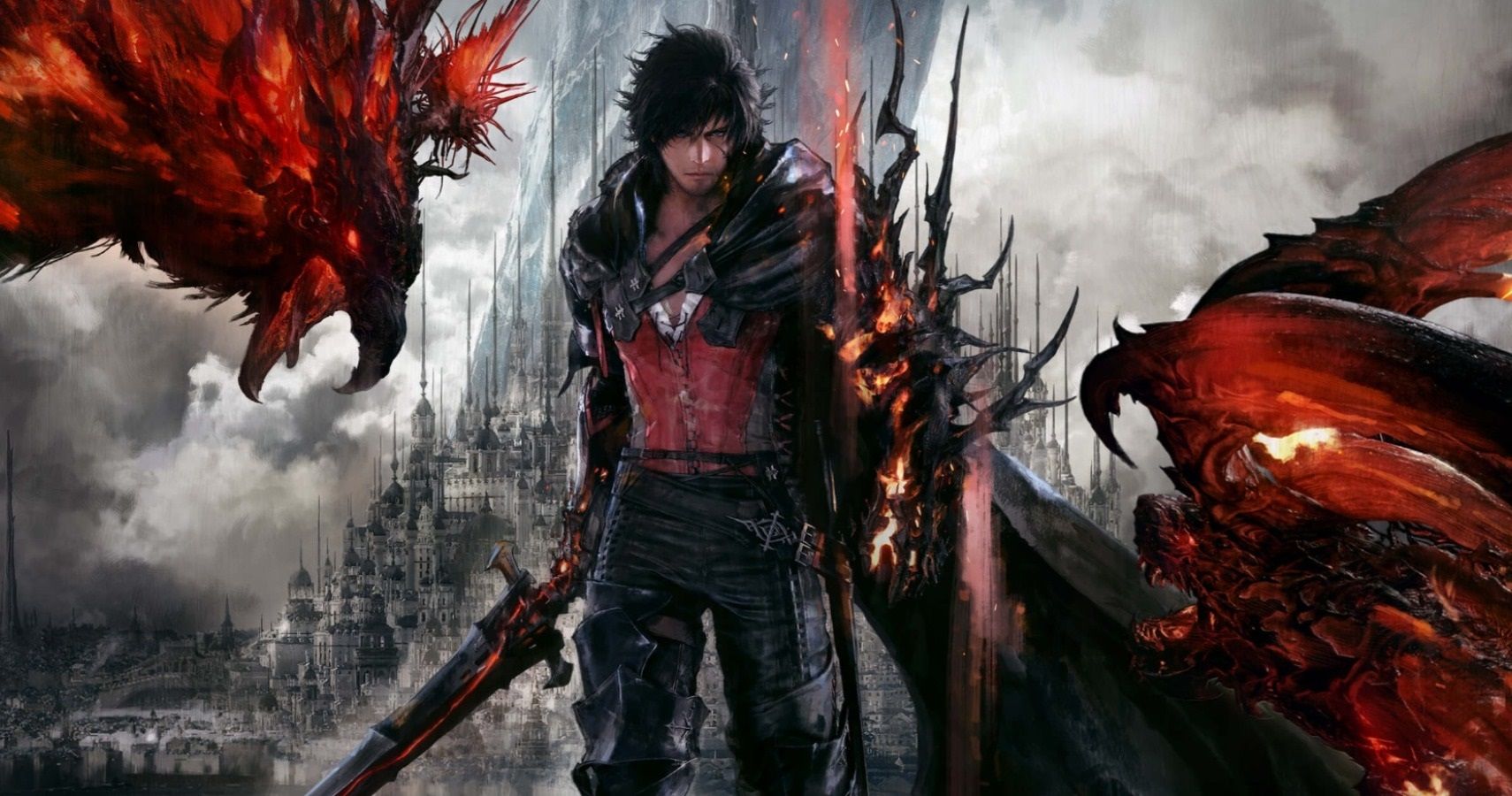What’s in a JRPG?
That should be a simple question. “Japanese role-playing game.” Boom! You’re done. Yet when we say “JRPG,” we mean more than that. We mean the tropes, the aesthetics, the musical cues long since associated with the genre’s many moods. “If it’s not about some scrappy lads killing God,” we say, “What in the hell are we even doing here?” Whether conscious or not, we have expectations of this genre, and if something strays too far outside of it, we tend to get a little cagey.
This is why it’s surprising my favorite JRPG of 2020 doesn’t have most of what I come to these things for. Instead, it’s about an ex-con’s struggle to stay off the streets, as he works his way up a rigged capitalist system and tries to make a decent wage while doing his best to help out his friends. Its battles unfold in dirty alleyways and on crowded streets, with mundane household items serving as makeshift weapons. There are no gods to kill or monsters to drive out, and the only evil cabals are moral puritans and organized crime. If you come to these things for comfort food, you won’t find it here.
And yet, Yakuza: Like A Dragon is definitively a JRPG. No, not just because it’s (a) a role-playing game that was (b) made in Japan. Every aspect of this release, each delectable little morsel, is informed by structural and design decisions that hearken back to Dragon Quest on the Famicom. It’s a deeply iterative game – something made by a team that has a clear respect for and reverence of the games they’ve been playing since childhood, yet doesn’t want to put that love towards more of the same. Instead, that team wants to ask a question: “Does the classical structure of a JRPG work when applied to our world?”
This isn’t just me inferring things, either. Like A Dragon’s charming protagonist, Kasuga Ichiban, is a diehard Dragon Quest nerd. Amidst his rough upbringing of being birthed in a soapland and raised by mobsters, Ichiban’s love for the iconic franchise is something that informs his worldview every step of the way. When he’s stabbed in the back and left for dead by his mentor, an old-school gangster in the Tojo Clan, he doesn’t fall to pieces and lose all sense of purpose. Instead, while homeless and living off dirty river fish, he uses his favorite game series to give himself a sense of purpose. He pledges to become a “hero” – a local that fights for good and sticks up for the little guy, even if it isn’t easy.
In a lesser game, like 2014’s interminably cynical South Park: The Stick of Truth, this would be played for a cheap joke. But where Like A Dragon’s narrative succeeds is in the way it smartly frames Kasuga’s perspective. In the real world, the “little guys” are the working class wronged and shunned by our unjust society, and “good” is the dismantling of their oppressors. From that perspective, then, the only way to be a “hero” is to stick up for them in their fight. To fight alongside houseless folks, to live among sex workers, to provide safety and shelter to the elderly, as they struggle against the ruling class and their jackbooted enforcers.
Oh, and if you’re a threat to those people, like a cop, a politician, or a plutocrat? Bad news – you’re the evil, and you’re ripe for smiting.
These ideals are baked into every aspect of Like A Dragon’s 40-ish hour runtime. Where most narratives would look down on drug dealers and cops fired for ratting out other cops, this game puts them in your party. Where many games would make cheap jokes about hoarders and people with diaper fetishes, this one humanizes them through memorable side quests. In essence, this is a title that confronts the players with unconscious bias, then turns you against the source of that bias and forces you to recognize the true evil of the world. Unlike something like Persona 5, a game that talks a whole lot but ultimately has nothing worthwhile to say about literally anything, Like A Dragon shows you the tangible impact of systemic oppression and tasks you with protecting its victims.
And, oh, what a joy it is to protect them, armed with splintering bats and broken brooms. Like A Dragon’s action sings throughout the briskly paced experience, with the best turn-based mechanics I’ve gotten my hands on since 2018’s masterful Octopath Traveler. While still buoyed by the same systems you know and love from traditional genre outings (particularly Persona 4 and Final Fantasy X,) Ryu Ga Gotoku Studios’ background in satisfying, tactile brawlers informs the flow and cadence of battles. Characters duck, weave, and shuffle in real-time, forcing you to pick the most opportune moments to strike, as opposed to simply going through the motions. If a bicycle or traffic cone stands between you and a foe, you can execute a move, then automatically pick them up and use them to buff your attack. In a genre where arenas tend to be little more than fancy backdrops, Like a Dragon makes the ingenious choice to make them an active part of every encounter. By consequence, its world of crowded crosswalks and dingy backstreets often feels more alive than any sprawling field or labyrinthine dungeon.
That sense of life, too, seeps into even the most minor aspects of the gameplay. Every enemy you encounter is treated like a Pokemon of sorts, to the point where you even have a “dex” of people you’re constantly trying to build out and know better. Every “summon” is just somebody you met on the street, tagging in to smack some idiot upside the head. Practically every piece of equipment, even, is tied to a unique shop or location, giving even the most minor of baubles a feeling of deliberate purpose and sense of place. There’s no filler here, no uncritical regurgitating of systems or mechanics or tropes – nothing is here “just because”. Because of this, Like A Dragon displays an unusual degree of confidence, aware of the inherent strengths and weaknesses of this fickle, imperfect medium.
In 2020, that’s refreshing. These days, most triple-A excursions can skate by with few to no fucks given in regards to purpose or focus. “Go here. Do this. Do it again.” These are the pleas of countless expensive games that tread water for 80-100 hours, desperate for players to not see the stagnating design choices or outright scams behind their systems. Now, more than ever, playing a big-budget video game feels like it wastes my time.
But releases like Yakuza: Like A Dragon keep me going. A game like this, so informed by its pedigree and so attuned to the ills of the world, is something that all developers should aspire to. It’s a work of art made with clear intent, and executed with firm mastery most artists can only hope to achieve. That intent permeates the whole experience, which results in a package where even the most minor elements feel like a bold brushstroke on a grand canvas. As a lifelong genre fan, this is the kind of direction I want to see from more JRPGs. This should be the template going forward, and not the stale WRPG bloat that’s unfortunately crept into the genre.
Because, ultimately, what makes a great JRPG isn’t a fantastical journey, an epic tale of gods and monsters, or a slow fight against an ambiguous evil. To me, a truly great JRPG is a series of deliberate and intentional systems that inform each other in every conceivable way. Every stat has a place, and that stat’s place informs the place of another stat, and so on and so forth. Each upgrade feels tangible, each new attack feels purposeful, and each “role” has an important part to “play”. The story’s place, then, isn’t to pad out time or paint a vivid picture of a massive world, but to give players an impetus to engage with those systems – a compelling raison d’etre for making those numbers go up. Like A Dragon does this, and does it with great aplomb.
It’s because of this, then, that I would make the case for Yakuza: Like A Dragon being a high point for this genre – and perhaps the highest point it will reach on the PS4 or Xbox One. And if this is where JRPGs are starting, going into the next generation of consoles, there’s reason to believe that we’re in for a decade of riches.
A PS4 copy of Yakuza: Like A Dragon was provided to TheGamer for this review. Yakuza: Like A Dragon will be available for PC, Xbox One, Xbox Series X/S, and PS4 on November 10, and available for PS5 on March 22.
Next: The Dark Pictures Anthology: Little Hope Review: Quick Time Evisceration
- Game Reviews
- Yakuza
- Yakuza: Like A Dragon
Bella Blondeau is a lovable miscreant with a heart of gold… or so she says.
She likes long walks in dingy arcades, loves horror good and bad, and has a passion for anime girls of any and all varieties. Her favorite game is Nier: Automata, because she loves both robots and being sad.
Source: Read Full Article
